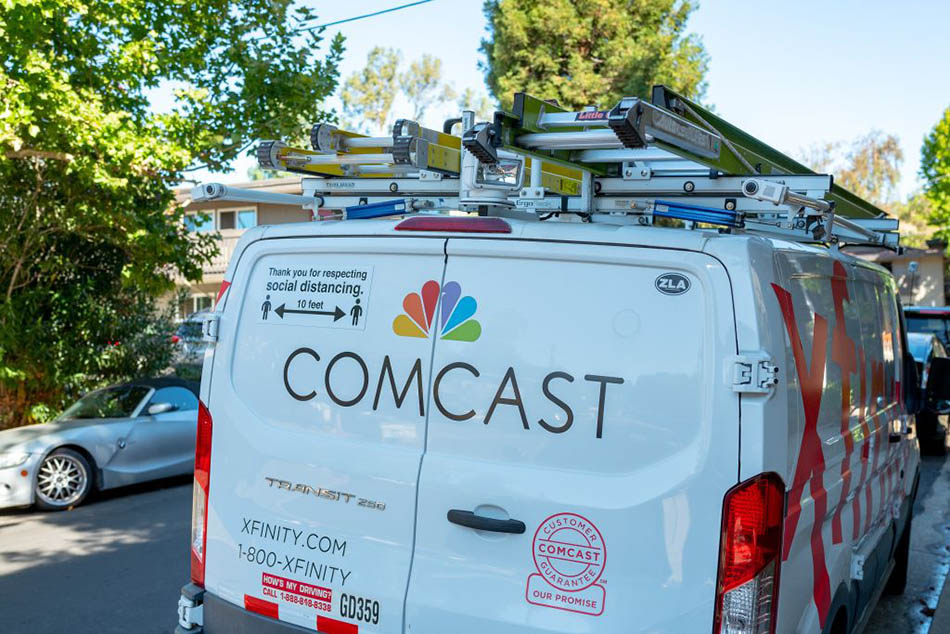Comcast Reports Loss on $8.6 Billion Sky Asset Write-Down
Cable adds 10,000 residential broadband subs; Peacock loses $614 million

The smarter way to stay on top of broadcasting and cable industry. Sign up below
You are now subscribed
Your newsletter sign-up was successful
Comcast reported a $4.2 billion third-quarter loss as it took an $8.6 billion write-down at its Sky unit in Europe.
Adjusted net income was up 4.5% to $4.22 billion despite a 1.5% decrease in revenue reflecting the overall slowdown in the media business. The company added 14,000 overall broadband subscribers, an improvement on the second quarter, and its Peacock streaming service continued to lose millions of dollars.
The loss on a per-share basis was $1.05 in the quarter, compared to earnings per share of 86 cents a year ago. Adjusted earnings per share rose 10.3% to 96 cents, beating Wall Street forecasts.
“This was a solid operating quarter for Comcast against significantly lowered expectations at cable,” Wells Fargo Securites media analyst Steven Cahall said. “At NBCU, linear pressure and competitive intensity vs. Peacock remain threats for multiple compression. Comcast’s strong balance sheet creates optionality, so strategic direction will matter a lot.”
Comcast share were up more than 7% Thursday morning.
Also: Economy, Hurricane Have Comcast Looking Ahead To Difficult 4th Quarter
Comcast said the Sky write-down was the result of higher interest rates and reduced estimated future cash flows.
The smarter way to stay on top of broadcasting and cable industry. Sign up below
“At Sky, our team continues to prudently manage through a difficult and rapidly changing macroeconomic and geopolitical period in the U.K. and Europe,” said Comcast chairman and CEO Brian Roberts.
Comcast acquired Sky, paying about $55 billion for a 75% share in the company after outbidding Fox.
Profit at Comcast Cable increased 5.4% to $7.5 billion as revenues rose 2.6% to $16.6 billion.
Broadband customers grew 1.5% to 32.2 million, compared to a loss of subscribers the previous quarter. Revenues from broadband increased 6.9% to $6.135 billion. The company had 29.8 million residential broadband customers, up 10,000 in the quarter, compared to a 281,000 increase a year ago.
Cord-cutting continued with a loss of 540,000 residential video customers. The company now has 15.973 million residential video customers. Revenue from video fell 2.8% to $5.22 billion.
NBCUniversal profits rose 24.8% to $1.7 billion despite losses at Peacock.
Peacock lost $614 million in the quarter on revenues of $506 million, compared to a loss of $520 million on revenue of $230 million a year ago. Comcast reiterated that Peacock had 15 million subscribers, a figure NBCUniversal CEO Jeff Shell disclosed earlier this month.
Adjusted earnings before interest, taxes, depreciation, and amortization (EBITDA) for NBCU’s media business decreased 41.5% to $583 million in the quarter. Media revenues fell 4.3% to $8.6 million in the quarter from the year before, when NBCU aired the Tokyo Olympics. Excluding the $1.8 billion in revenue generated by the Olympics, revenue was up 4.4%, NBCU said.
Also: Comcast Surpasses 5 Million Xfinity Mobile Lines After Wireless Service's Biggest Quarter Ever
Ad revenue was down 35.1% without the Olympics, though Peacock ad revenues rose. Distribution revenue fell 13.7%.
Earnings at the company’s theme parks rose 88.6% to $819 million, surpassing pre-COVID levels.
Sky EBITDA dropped 27.9% to $701 million. The earnings reflected the timing of sporting events and corresponding programming amortization, the company said. Sky revenue fell 14.7% to $4.3 billion.
“This performance is a testament to our consistent strategic focus on innovation and our team’s ability to execute at the highest level in any environment,” Roberts said. “Together, our company is a leader in very large and profitable markets. Despite the challenges that may lie ahead, we are in an enviable strategic and financial position, and our future remains bright.” ■
Jon has been business editor of Broadcasting+Cable since 2010. He focuses on revenue-generating activities, including advertising and distribution, as well as executive intrigue and merger and acquisition activity. Just about any story is fair game, if a dollar sign can make its way into the article. Before B+C, Jon covered the industry for TVWeek, Cable World, Electronic Media, Advertising Age and The New York Post. A native New Yorker, Jon is hiding in plain sight in the suburbs of Chicago.

